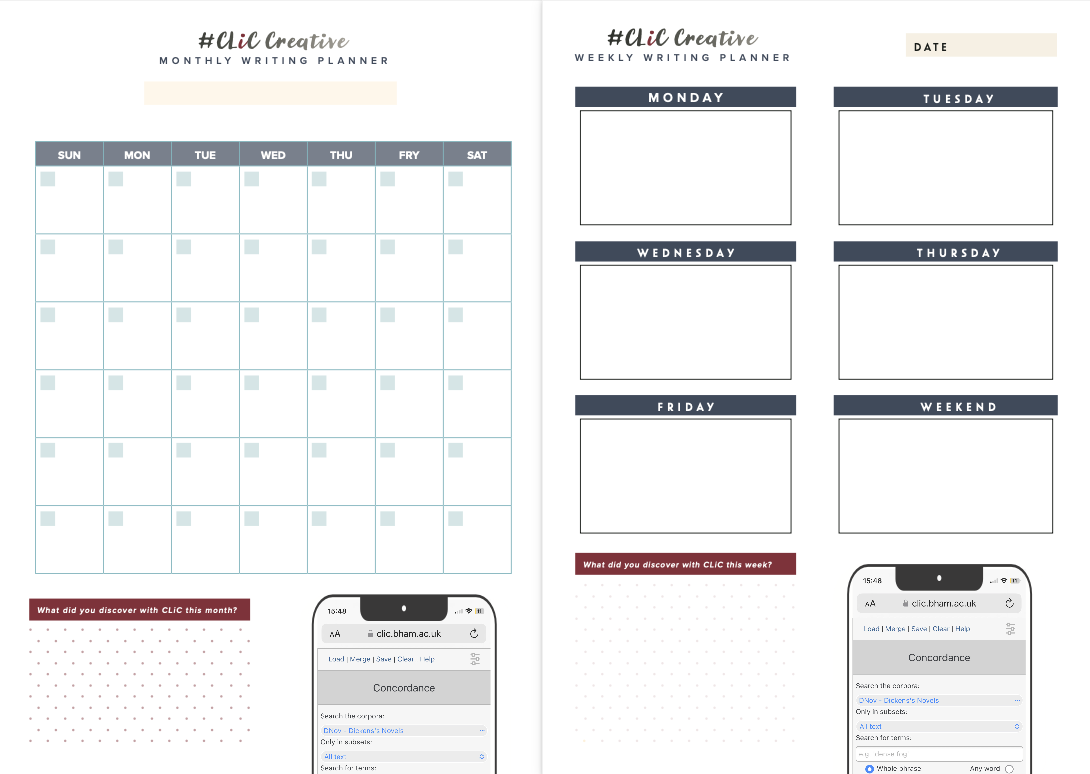Today we have some exciting news. Professor Michaela Mahlberg (@MichaMahlberg)and Dr Rosalind White (@DrRosalindWhite) will be launching a new project, #CLiCCreative. If this is your first time on our blog, the CLiC Web App facilitates computer-assisted textual analysis of nineteenth-century literature. CLiC-assisted research has revealed recurring textual features of narrative fiction that are easily overlooked with more conventional textual analysis methods. Through CLiC, we can help make these features visible. #CLiCCreative will demonstrate how our app can serve as both a creative resource and innovative research tool for writers.
CLiC as a Creative Resource…
 When we fall under the spell of a skilled writer, we are struck by the distinctive quality of their “voice” and feel as though they are speaking directly to us. But what exactly is it that draws us into a text? In the coming weeks, we’ll be mining the CLiC corpus for answers.
When we fall under the spell of a skilled writer, we are struck by the distinctive quality of their “voice” and feel as though they are speaking directly to us. But what exactly is it that draws us into a text? In the coming weeks, we’ll be mining the CLiC corpus for answers.
We’ll be joined (in spirit) by various masters and mistresses of the pen, including Charles Dickens, Jane Austen and George Eliot. We are curious to explore why their prose has stood the test of time. What characterises their authorial voice? How do they devise intricate plots? What can we learn from their approach to character development?
The CLiC Web App has been developed with a specific focus on the distinction between narrative and fictional speech, so we will be paying attention to the stylistic choices made by these authors, particularly their approach to sentence patterns, diction and punctuation.
As a Research Tool…
 When it comes to creating a believable and immersive work of historical fiction, research is key. Once you have a general understanding of the ‘big picture’ you need to zoom in on the specific details that are relevant to your narrative: be it the fashion of the time, military conventions, the unspoken rules of high society, or the food that was typically dished up.
When it comes to creating a believable and immersive work of historical fiction, research is key. Once you have a general understanding of the ‘big picture’ you need to zoom in on the specific details that are relevant to your narrative: be it the fashion of the time, military conventions, the unspoken rules of high society, or the food that was typically dished up.
It is at this stage that you likely realise that your chosen epoch of history proves an unexpected minefield for the twenty-first-century interloper. Opportunities to unwittingly activate anachronisms abound. Every item of clothing, weapon, device, or mode of transport must be carefully vetted, every procedure, topic of conversation or figure of speech scrutinised.
Conventional methods of research prove a formidable tool in a writer’s inventory (visiting historical sites, consulting relevant archives, learning from established historians and watching relevant documentaries). But often a more creative approach to learning about the past can better serve the aspiring novelist – particularly one who wants to authentically capture what it felt like to live in a certain period of time.
This is where we come in. The CLiC Web App enables you to consult our corpora of nineteenth-century texts at the click of a button. Whether you want to cross-reference your existing research or trace the path of a specific topic across the long nineteenth century.
Get involved!
In the coming weeks, we’ll be showcasing CLiC as a research tool, exploring why we are so fascinated by the Victorian era, and utilising CLiC to learn the secrets of our favourite authors.
To get you started with your own writing or journey of textual exploration you can download our free printable writing planners, available as a daily, monthly and weekly schedule here.
We’d also like to use this time to ask creative writers how we can aid your creative process or help refine your skills. How can we adapt CLiC into a research tool and/or creative resource that better caters to your needs? You can get in touch with us via email at clic@contacts.bham.ac.uk. You can also tweet us by using the hashtag #CLiCCreative or tagging us @CLiC_Fiction.


Join the discussion
0 people are already talking about this, why not let us know what you think?